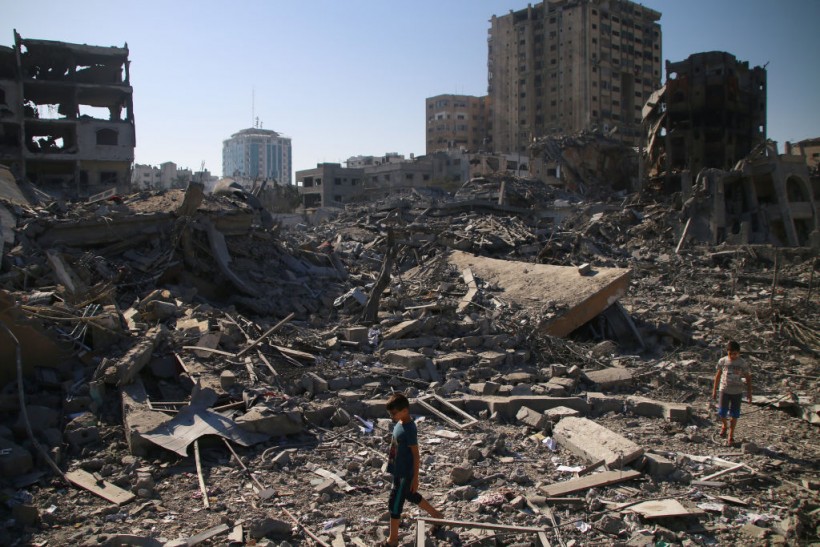In a pivotal diplomatic move, United States (US) President Joe Biden has spearheaded efforts to catalyze United Nations Security Council action to achieve a temporary ceasefire in the Israel-Gaza conflict.
In line with this, the US has proposed a draft resolution at the Council, calling for a halt to the fighting between Israel and Hamas while cautioning against an Israeli ground invasion into Rafah, a city where hundreds of thousands of displaced Palestinians have sought refuge amidst the escalating violence.
US Calls for 'Temporary Ceasefire' in Gaza
GAZA CITY, GAZA - OCTOBER 13: Palestinian citizens inspect damage to their homes caused by Israeli airstrikes on October 13, 2023 in Gaza City, Gaza. Israel has sealed off Gaza and launched sustained retaliatory air strikes, which have killed at least 1,400 people with more than 300,000 displaced, after a large-scale attack by Hamas. On October 7, the Palestinian militant group Hamas launched a surprise attack on Israel from Gaza by land, sea, and air, killing over 1,300 people and wounding around 2,800. Israeli soldiers and civilians have also been taken hostage by Hamas and moved into Gaza. The attack prompted a declaration of war by Israeli Prime Minister Benjamin Netanyahu and the announcement of an emergency wartime government.
The US proposal emerges as a response to an Algerian draft resolution calling for an immediate ceasefire, which the US has signaled to veto due to fears of disrupting discussions involving the U.S., Egypt, Israel, and Qatar aimed at brokering a temporary halt to the conflict and securing the release of hostages held by Hamas. The Security Council is slated to convene for a vote on the Algerian resolution Tuesday morning.
Outlined in the US-proposed draft is a call for a "temporary ceasefire in Gaza as soon as practicable."The resolution does not exactly align with the majority preference of Security Council members, who advocate for an immediate ceasefire.
The US has traditionally shielded its ally Israel from UN actions, refraining from endorsing ceasefire initiatives and emphasizing Israel's right to self-defense in response to Hamas' terrorist activities, particularly the attack launched on October 7. The country has previously voted against multiple Security Council resolutions pertaining to the conflict.
A senior US official clarified that the administration does not intend to expedite a vote on the resolution, stating that urgent action by the Council is not deemed necessary. Instead, the US aims to intensify negotiation efforts on the ground.
"We do not plan to rush to a vote," the anonymous senior US official said, adding that the administration does "not believe the Council has to take urgent action" with a deadline for a vote.
The proposed US draft resolution unequivocally condemns propositions made by certain Israeli government officials advocating for Jewish settlers to relocate to Gaza.
Additionally, it firmly opposes any endeavors aimed at altering the demographic or territorial landscape of Gaza, actions deemed to contravene international law.
The resolution also explicitly denounces any measures undertaken by any party that would diminish Gaza's territorial integrity, whether on a temporary or permanent basis.
This encompasses the establishment of buffer zones, whether sanctioned officially or unofficially, as well as the systematic demolition of civilian infrastructure, actions perceived as detrimental to the region's stability and well-being.
Read Also: Gaza's Health Ministry Claims Over 29,000 Palestinians Killed in Israel-Hamas War So Far
US Draft Highlights Risks of Israeli Offensive in Rafah
President Joe Biden told White House reporters on Friday that he has conveyed his stance on the matter following extensive discussions with Israeli Prime Minister Benjamin Netanyahu, emphasizing the imperative of a temporary ceasefire to secure the release of hostages still held by Hamas.
The US draft resolution underscores the potential dire consequences of an Israeli ground offensive in Rafah, warning of exacerbated harm to civilians and their potential displacement into neighboring territories, posing significant threats to regional peace and security.
Despite mounting international pressure, Israel has signaled its intent to escalate ground operations in Rafah as part of its broader objective to dismantle Hamas following the October 7 attacks.
Concerns persist that military action within the densely populated city could trigger mass displacement and casualties among civilians.
The Biden administration has increasingly voiced apprehensions regarding Israel's conduct in the conflict. Last week, President Biden reportedly urged Netanyahu to reconsider military actions, stressing that further escalation should be avoided.
The US draft resolution also advocates for the release of Israeli hostages, a pivotal aspect of the proposed ceasefire initiative.
The resolution is set for private discussion on Tuesday, although the timeline for a formal vote remains uncertain. Passage of the resolution would necessitate more than nine affirmative votes from Security Council members, without any vetoes from permanent members.
The draft resolution reflects ongoing diplomatic efforts to mitigate the humanitarian crisis and bring about a cessation of hostilities in Gaza, amid growing international concern over the escalating violence and its toll on civilian populations.
Related Article: Israel Gives Deadline for Rafah Offensive; Gantz Warns of Action if Hostages Not Freed by March 10








